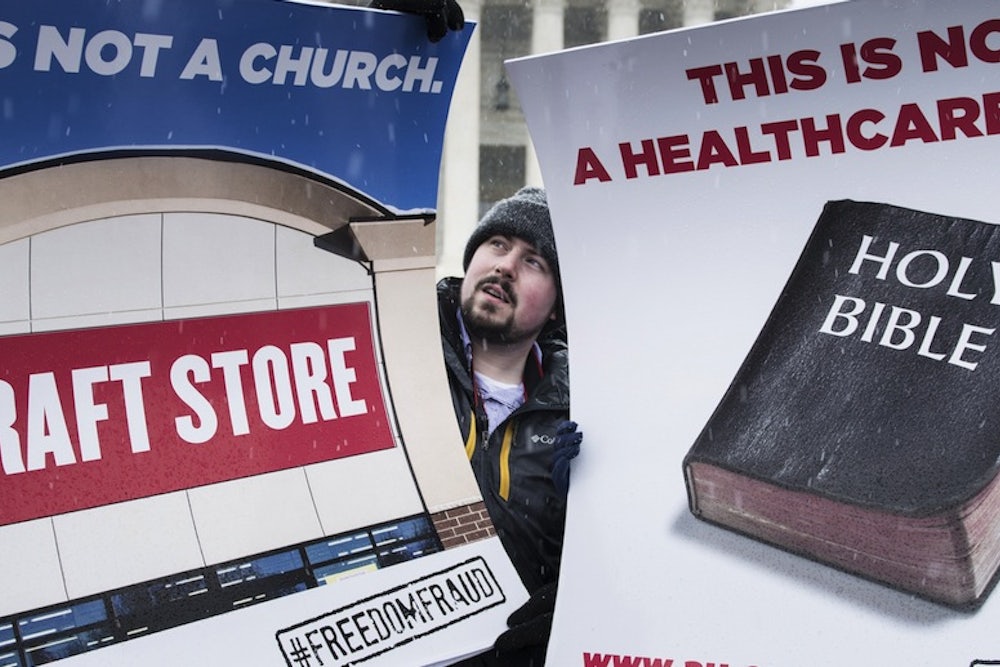Imagine you work for The Closely Held Corporation, and have for several years. You enjoy a full benefits package, including a health insurance plan that covers all prescription contraceptives cost free. Everything's great. Then on Wednesday, your boss, Mr. Prude, announces that, pursuant to the Supreme Court ruling in Hobby Lobby, he'll be imputing his religious beliefs to Closely Held, and using the corporation's rights under the Religious Freedom Restoration Act to cancel your otherwise-guaranteed contraceptive coverage.
Maybe that ultimately doesn't create a major practical problem for you, but it still sucks—both for financial reasons, and because you feel like your boss has casted judgment on your health and lifestyle choices that are none of his business, and actually imposed a penalty for them.
Then one day there's a huge catastrophe at Closely Held's main factory—a fire or a spill—that's a direct consequence of your employer's negligence. You're injured. Dozens of your coworkers are injured. A few people die. Unfortunately, Closely Held doesn't have the means to adequately compensate you and your coworkers for your injuries and other claims. And for the purposes of this thought experiment, let’s assume that Closely Held was not undercapitalized for corporate veil piercing law and that Closely Held’s insurance policy limits do not cover the total damages. Closely Held files for bankruptcy, you're unemployed and, thanks to your injury, you're also unable to perform most of the jobs you're qualified to do.
So you go to court and you argue that Mr. Prude should have to compensate you himself. The Supreme Court disregarded the separateness of Mr. Prude and Closely Held for the purposes of upholding Mr. Prude's religious liberties. Likewise, the court should now disregard the separateness for the purposes of remedying your injury.
You could make that argument. But it probably wouldn't work.
And that's where I part ways with Matt Yglesias when he argues that the procedural trick the Supreme Court used to rule for Hobby Lobby is incidental to liberals' real grievance, which is that the Court decided religious freedom trumps a legal requirement to provide comprehensive health benefits.
I agree with him that some Supreme Court critics have made conceptual errors about the role corporate personhood played in the ruling. And I agree that the most acute source of liberal anger is rightly about the immediate consequences of the ruling, not the process. But the process matters, too, because it offers a troubling view into the way the government treats disputes between business owners and everyone else.
First, it creates a theoretical slippery slope along which sincerely religious and opportunistically religious owners of corporations—closely held and not—will start citing the ruling as justification for ignoring other generally applicable laws. I am admittedly less concerned about this slippery slope than other liberals, for reasons discussed here and here. But it's undeniable that the Hobby Lobby ruling effectively gives for-profit corporations a power to burden workers that it didn't have, or wasn't recognized, before.
That would perhaps be less problematic if it were paired with new rights for workers as well. But it's not. I'd argue that the logic of the ruling creates a slippery slope in the other direction, too. That companies taking advantage of this ruling have morally forfeited their claims to the full benefits and protections of corporate separateness. But legally, they still enjoy all of them. Even if for spiritual purposes—and, thus, the purpose of rescinding otherwise guaranteed health coverage—they and their businesses are one and the same.
This is an entirely new kind of carveout. Yet Bloomberg's Megan McArdle shrugs it off as "boring compared to War on Women!"
McArdle is nothing if not attuned to the trials and tribulations of corporate America, though. If a court were to rule that by imputing its personal religious views to the corporate person, Hobby Lobby had sacrificed its limited liability protections in certain circumstances, I expect she'd be pretty concerned. If Congress or state legislatures passed laws puncturing limited liability protection for closely held corporations in instances when they can't financially remedy injuries they cause, we'd be on yet another slippery slope—but this time to economic doom.
Of course, neither of those things is likely to happen, ever. And that's why the process objection in Hobby Lobby actually does matter. When it comes to protecting business owners from the scourge of employee rights, the Court will find a way. Or at least it will try. When it comes to protecting employees, it won't. Even if the logical implications of its pro-business rulings should compel it to.
